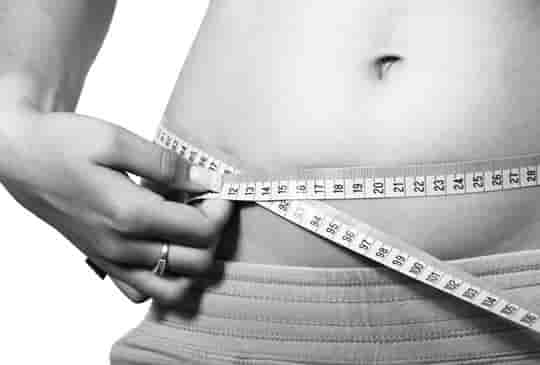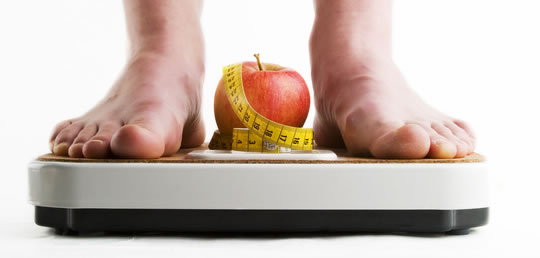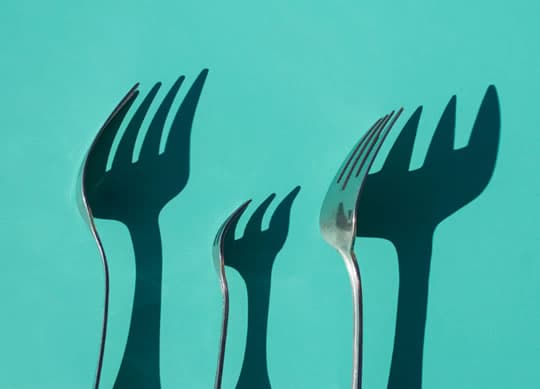Stop food cravings with these ten simple tips based on the psychological research.
1. Tap your forehead
Anything that will distract you from thinking about food cravings will work.
One study has even found that tapping your forehead with your index finger can do the trick.
Just don’t let the tapping turn into punching — you’re not supposed to draw blood, no matter how strong the cravings get!
2. Change how you think
A slightly deeper psychological approach is to start thinking differently.
Take a moment to consider the long-term consequences of eating the wrong foods.
Dr Kathryn Demos, one of the authors of a study which tested this approach on food cravings, explained:
“We found that simply thinking in a different way affects how the brain responds to tempting food cues in individuals with obesity.
Through the MRI scans we identified that thinking about the long-term negative impact of eating unhealthy foods increased activity in a region of the brain involved in inhibitory control and self-regulation.
Our results show the promising possibility that focusing on the long-term consequences of consuming unhealthy foods could help diminish cravings and, as a result, potentially enhance weight-loss efforts.”
3. Play Tetris to stop food cravings
Just three minutes of playing Tetris can reduce cravings for food, cigarettes and alcohol, according to a study published in the journal Appetite.
The psychologists concluded that Tetris, a retro tile-matching puzzle game, may provide a visual distraction which helps people control their cravings.
4. Use your imagination
Try thinking about how a rainbow looks or the smell of eucalyptus.
Or even stare at a random pattern of dots — the kind you get if you pull the aerial out of the TV.
All have been found to reduce the vividness of food cravings.
That study’s authors explain that:
“…engaging in a simple visual task seems to hold real promise as a method for curbing food cravings.
…real-world implementations could incorporate the dynamic visual noise display into existing accessible technologies, such as the smart phone and other mobile, hand-held computing devices.”
Your imagination can be a powerful ally in the fight against food cravings.
5. Look at loads of pictures of food
It’s the most unlikely weight-loss trick ever: looking at endless pictures of foods can make them less enjoyable to eat, a recent study has found.
While a few photos might enhance the appetite, contrary to what you’d expect, people are actually put off the taste by looking at loads of pictures of food.
6. Go for a walk to stop food cravings
A 15-minute walk is enough to stop food cravings brought on by stressful situations, a study has found.
The authors concluded:
“Short bouts of physical activity may reduce the craving for sugary snacks in overweight people.
When snacking has become habitual and poorly regulated by overweight people, the promotion of short bouts of physical activity could be valuable for reducing the urge to consume at times when the person may be particularly vulnerable, such as during stress and when snack foods are available.”
7. Protein-rich breakfast
Research shows that eating a good breakfast — particularly one rich in protein — boosts a critical neurotransmitter, which may lower food cravings later in the day.
Dr. Heather Leidy, an assistant professor of nutrition and exercise physiology who led the study, said:
“Our research showed that people experience a dramatic decline in cravings for sweet foods when they eat breakfast.
However, breakfasts that are high in protein also reduced cravings for savory — or high-fat — foods.
On the other hand, if breakfast is skipped, these cravings continue to rise throughout the day.”
8. Stop food cravings with chewing gum
It’s an old trick, but one that can work.
It may not look good chewing gum, but some studies suggest it can reduce the intake of snacks.
Dr. Paula J Geiselman who has conducted a study on this, explained that her research…
“…demonstrates the potential role chewing gum can play in appetite control, reduction of snack cravings and weight management.
Even small changes in calories can have an impact in the long term.
And, this research supports the role of chewing gum as an easy, practical tool for managing snack, especially sweet snack, intake and cravings.”
9. Less food cravings from sleeping well
People who are short of sleep find it difficult to resist temptations, one study has found.
Matthew Walker, one of its authors, explained:
“What we have discovered is that high-level brain regions required for complex judgments and decisions become blunted by a lack of sleep, while more primal brain structures that control motivation and desire are amplified.”
In other words, being short of sleep = desire for sugary snacks.
10. Pay attention to your emotions
Tuning in to your emotions is an important step in managing food cravings.
One study has found that people lose more weight when they learn to get in touch with their feelings about food.
That study’s authors concluded:
“With a better understanding of how they feel and how to use emotions to make better decisions, people will not only eat better, they will also likely be happier and healthier because they relate better to others and are more concerned with their overall well-being.”
.










